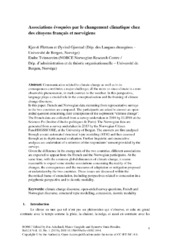| dc.contributor.author | Fløttum, Kjersti | |
| dc.contributor.author | Gjerstad, Øyvind | |
| dc.contributor.author | Tvinnereim, Endre | |
| dc.date.accessioned | 2020-08-17T09:07:05Z | |
| dc.date.available | 2020-08-17T09:07:05Z | |
| dc.date.issued | 2019-11-07 | |
| dc.Published | Fløttum KF, Gjerstad Ø, Tvinnereim ET. Associations évoquées par le changement climatique chez des citoyens français et norvégiens. Bergen Language and Linguistics Studies (BeLLS). 2019;10(1):12 | eng |
| dc.identifier.issn | 1892-2449 | |
| dc.identifier.uri | https://hdl.handle.net/1956/23806 | |
| dc.description.abstract | Communication related to climate change as well as to its consequences constitutes a major challenge; all the more so since climate is a nonobservable phenomenon, in stark contrast to the weather. In this perspective, language plays a crucial role in the conceptualisation and the framing of climate change discourse. In this paper, French and Norwegian data stemming from representative surveys in the two countries are compared. The participants are asked to answer an openended question concerning their conceptions of the expression “climate change”. The French data are collected from a survey undertaken in 2016 by ELIPSS at the Sciences Po (Institut d'études politiques de Paris). The Norwegian data are generated from a survey undertaken in 2013 by the Norwegian Citizen Panel/DIGSSCORE, at the University of Bergen. The answers are first analysed through a semi-automated structural topic modeling (STM) and then assessed through an in-depth manual evaluation. Further linguistic and enunciative analyses are undertaken of a selection of the respondents’ answer provided by the surveys. Given the difference in the energy mix of the two countries, different associations are expected to appear from the French and the Norwegian participants. At the same time, with the common global dimension of climate change, it seems reasonable to expect some similar associations concerning the reality of the changes, the consequences and the measures of adaptation or mitigation proposed or undertaken by the two countries. These issues are discussed within the theoretical frame of enunciation, including perspectives related to concession in a polyphonic perspective and to deontic modality. | en_US |
| dc.language.iso | fra | eng |
| dc.publisher | The University of Bergen | eng |
| dc.relation.uri | https://bells.uib.no/index.php/bells/issue/view/376 | |
| dc.rights | Attribution-Non Commercial-No Derivatives CC BY-NC-ND | eng |
| dc.rights.uri | http://creativecommons.org/licenses/by-nc-nd/4.0/ | eng |
| dc.title | Associations évoquées par le changement climatique chezdes citoyens français et norvégiens | eng |
| dc.type | Peer reviewed | |
| dc.type | Journal article | |
| dc.date.updated | 2020-01-28T09:36:38Z | |
| dc.description.version | publishedVersion | |
| dc.rights.holder | Copyright 2019 The Authors | eng |
| dc.identifier.doi | https://doi.org/10.15845/bells.v10i1.1444 | |
| dc.identifier.cristin | 1745077 | |
| dc.source.journal | Bergen Language and Linguistics Studies (BeLLS) | |
| dc.relation.project | Andre: Akademiaavtalen Equinor-UiB nr. 803589 | |
| dc.relation.project | Norges forskningsråd: 220654 | |
| dc.relation.project | Andre: AKADEMIAAVTALEN EQUINOR-UIB NR. 803589 | |

